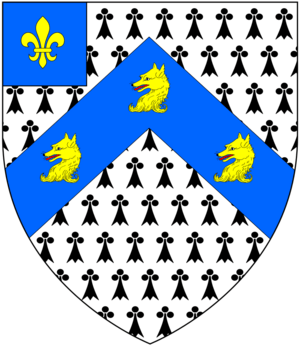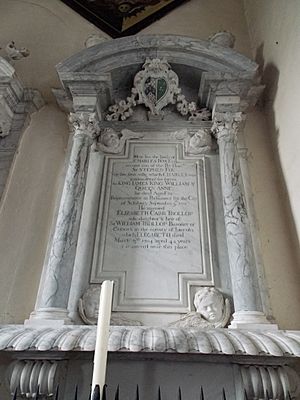Charles Fox (1660–1713) facts for kids
Charles Fox (born January 2, 1660 – died September 21, 1713) was an English politician. He lived in Chiswick, Middlesex, and Farley, Wiltshire. Charles Fox was a member of the Tory Party, a political group in England. He served in the English House of Commons and later the House of Commons of Great Britain from 1680 until his death in 1713. He held an important and well-paid job called Paymaster of the Forces. This meant he was in charge of paying the army. He worked for King James II, King William III, and Queen Anne.
Charles Fox's Life
Charles Fox was born in Brussels just before the time when the monarchy was brought back to England (called the Restoration). He was the third son of Sir Stephen Fox. He was named after King Charles II of England, who was his godfather. In 1670, he became a naturalized citizen of England.
His older brothers had already passed away. In 1676, Charles traveled around Europe with Dr. Younger, who later became the Dean of Salisbury. When he returned in 1679, he married Elizabeth. She was the daughter of Sir William Trollope, 2nd Baronet. Charles and Elizabeth did not have any children.
Charles received the Water Eaton estate, near Cricklade, when he married. He first tried to become a Member of Parliament (MP) for Cricklade in 1679 but was not successful. Later that year, he ran for the Eye area. He won this election and became an MP, even though he was still quite young. He likely supported the King's side in Parliament.
In 1682, Charles was given the important job of paymaster-general, working under his father. This was a very profitable position. However, Charles was described as easy-going and never became a leading figure in government or politics.
He ran for Parliament again in Cricklade in 1685 and won. Except for a short time in 1701, he represented either Cricklade or Salisbury for the rest of his life. He was not known for making big speeches. However, he was active in committees, which are groups that study specific issues. For example, he worked on committees about army finances and bankruptcy laws.
Charles was concerned when King James II started using Roman Catholic officers in the army. This was a big issue at the time. His friends advised him to stay away from Parliament so he wouldn't upset the King. However, Charles felt strongly about supporting the Church of England. He went to Parliament and voted against the King's policy. Because of this, King James II was very angry. Charles was fired from his valuable job as paymaster.
The paymaster job, which was worth a lot of money, was given to someone else. However, Charles was later allowed to meet the King again. In 1688, the King's agents hoped Charles would support the King's religious policies if he was re-elected.
In 1689, Charles Fox was again active in Parliament. He served on 17 different committees. He also spoke twice and helped count votes in four important decisions. He strongly denied old rumors that his father had offered bribes to other Members of Parliament.
Charles Fox was a High Church Tory. This meant he strongly supported the Church of England and was very loyal to his political party. He was more of a party man than his father. He regularly voted to provide money for the government under King William III and Queen Anne.
However, he was dismissed from his roles twice more. In 1696, he was fired for voting against punishing Sir John Fenwick, 3rd Baronet. Later, under Queen Anne, he was dismissed for voting for something called the "Tack."
Charles Fox passed away in Chiswick on September 21, 1713, before his father. He was buried in Farley.
 | Stephanie Wilson |
 | Charles Bolden |
 | Ronald McNair |
 | Frederick D. Gregory |



